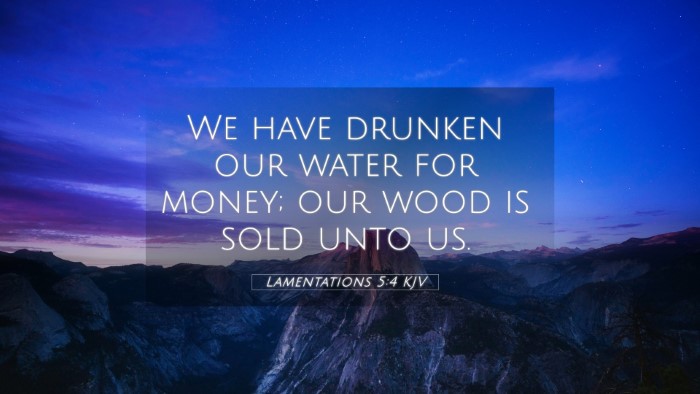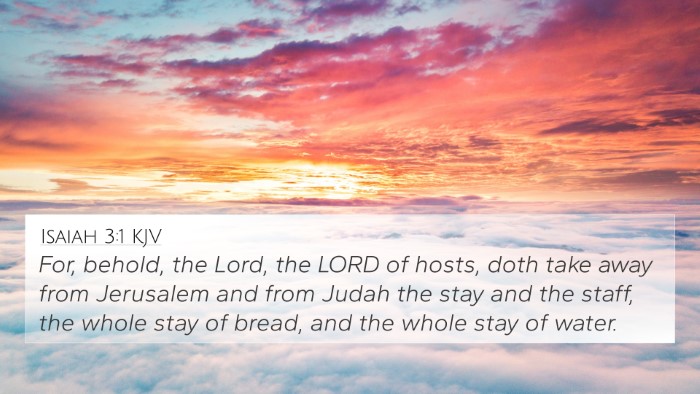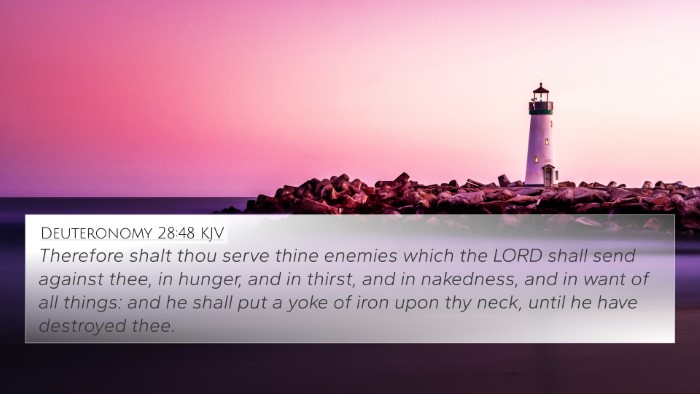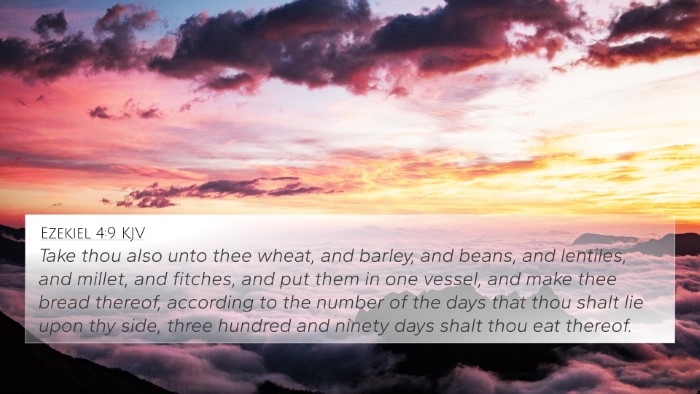Lamentations 5:4 Interpretation and Meaning
Lamentations 5:4 states, "We have drunk our water for money; our wood is sold to us." This verse is a poignant expression of the suffering and deprivation faced by the people of Judah after the destruction of Jerusalem. In this context, it denotes the heavy burden of oppression, where basic needs such as water and wood are commodified, illustrating a stark picture of desperation.
Summary of Lamentations 5:4
The verse serves as a lament for the lost dignity and freedom of the Israelite community, highlighting their plight as they suffer under the rule of those who oppress them. The use of "money" emphasizes the economic struggle, suggesting that even the most basic necessities of life are now unattainable without payment, showcasing a significant reversal of fortunes.
Commentary Insights
-
Matthew Henry:
Henry underscores the deep humiliation experienced by the Israelites, who have resorted to paying for something as fundamental as water. He draws attention to the spiritual implications of such degradation, insinuating that this reflects their neglect of God’s provisions and a departure from Divine favor.
-
Albert Barnes:
Barnes emphasizes the cry of desperation in the verse. He views this commodification of resources as indicative of the broader social and spiritual decline of the nation. In his analysis, this reflects not merely a physical scarcity but also a spiritual famine, where the people are disconnected from the abundance that God once provided.
-
Adam Clarke:
Clarke notes the significance of "our wood is sold to us," suggesting a level of dependence that the Israelites had not previously known. He interprets this as a metaphor for their spiritual insolvency and their need for redemption, pointing out the irony that necessities for survival are now being sold—a reflection of their captivity and loss of freedom.
Bible Verse Cross-References
Lamentations 5:4 can be cross-referenced with several other scripture passages that contextualize and deepen the understanding of the struggles depicted:
- Isaiah 55:1: "Come, everyone who thirsts, come to the waters; and he who has no money, come, buy and eat!" - This verse emphasizes God's provision freely available to those in need.
- Jeremiah 14:3-4: "Their nobles send their boys for water; they come to the cisterns; they find no water..." - Reflects the similar plight and desperation for basic resources.
- Psalm 42:1: "As the deer pants for flowing streams, so pants my soul for you, O God." - This illustrates a thirst that is both physical and spiritual, resonating with the longing expressed in Lamentations.
- Ezekiel 4:16: "Moreover, he said to me, 'Son of man, behold, I will break the supply of bread in Jerusalem.'" - This verse connects with the themes of scarcity and oppression mentioned in Lamentations.
- Deuteronomy 28:48: "Therefore you shall serve your enemies whom the Lord will send against you, in hunger and thirst..." - A reminder of the consequences of disobedience, linking moral failing with physical suffering.
- Proverbs 22:7: "The rich rules over the poor, and the borrower is the slave of the lender." - This highlights the economic oppression reflected in Lamentations 5:4.
- Matthew 25:35: "For I was hungry and you gave me food, I was thirsty and you gave me drink..." - Jesus' words echo the importance of providing for those in need, contrasting the desperation of Lamentations.
Thematic Connections
The struggle for basic needs in Lamentations 5:4 mirrors several other biblical themes, including:
- Oppression and Liberation: The themes of oppression in Lamentations connect with narratives of liberation throughout the Bible, particularly in Exodus.
- Spiritual Hunger: As articulated in Lamentations, there is a poignant yearning for both physical sustenance and spiritual fulfillment, reminiscent of Jesus' teachings.
- Divine Justice: The Israelites' plight serves as a reminder of God's justice, showing how moral failings can lead to societal collapse and the loss of independence.
Using Cross-References to Deepen Understanding
For those engaged in cross-referencing Bible verses, tools such as a Bible concordance or a Bible cross-reference guide can be invaluable. By identifying connections between Old and New Testament verses, one can develop a more comprehensive understanding of themes such as oppression, faith, and divine provision.
When studying Lamentations 5:4, consider exploring:
- How to find cross-references in the Bible: Use thematic studies to link verses across different books.
- Comparative study of Pauline epistles: Analyze how Paul's teachings relate to themes of suffering and redemption found in Lamentations.
- Cross-referencing Psalms with New Testament teachings: Investigate how the Psalms reflect similar experiences of lament and hope.
- Bible cross-references for sermon preparation: Consider using Lamentations alongside other texts to develop messages focused on suffering and restoration.
Conclusion
Lamentations 5:4 serves as a profound reflection on the human condition, highlighting the pain of deprivation and the quest for justice and dignity. Through the lens of public domain commentaries and an exploration of related biblical texts, it is evident that this verse resonates with timeless themes of suffering, loss, and the yearning for divine provision and mercy. Engaging with cross-referencing methods can enrich one's study, allowing deeper connections between scripture and personal faith journeys.





